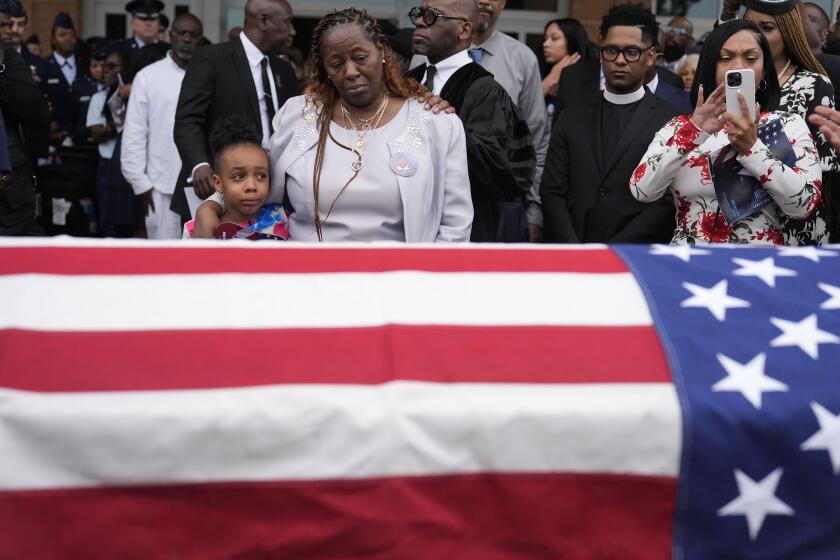MEETING IN MOSCOW : Clinton Appears to Carry the Student Vote--at Moscow State : Speech: Though not all agreed with him, U.S. President earns standing ovation from university audience.
To the left of President Clinton’s podium at Moscow State University on Wednesday loomed an engraved quotation from Vladimir I. Lenin; to the right were bon mots from Karl Marx.
Standing tall against a background mosaic of red flags, the smiling, relaxed U.S. President delivered an upbeat lecture on Western civics and democracy, reassuring students at Russia’s most prestigious university that “you have ushered in a new era of freedom, and you can go the rest of the way.”
Clinton’s frank, 50-minute speech won a standing ovation from this post-Soviet generation of Russian students. They are more sophisticated, more realistic and more critical in their appraisal of the West than the young people who listened to then-President Ronald Reagan deliver an address in the same auditorium in 1988.
One young woman complained that Clinton had been too much “in the teeth”--Russian for “in your face”--by vociferously opposing Moscow’s plans to sell nuclear technology to Iran.
But others said they agreed with the President more than with their own leader, President Boris N. Yeltsin.
“If Yeltsin had come here, he wouldn’t have filled this auditorium,” said Galina I. Brizhan, 23. “He’s not very popular in Russia right now.”
Brizhan was being diplomatic. A recent poll by the Washington-based Tarrance Group found that 9% of Russians believe that Yeltsin deserves to be reelected next year.
The loud strains of Steve Winwood tunes were blasting through a late-afternoon drizzle as Clinton and the First Lady arrived at the university, housed in a sharp-spired Gothic skyscraper put up by Soviet dictator Josef Stalin.
Speaking to about 1,000 students and faculty, Clinton harked back to pre-Soviet traditions, quoting novelist Leo N. Tolstoy and scientist Mikahil Lomonosov.
The President argued that the historic “strength and resilience of the Russian people” will enable this troubled country to stay the wrenching course of economic and political reform.
“Economic reform must not be an excuse for the privileged and the strong to prey upon the weak,” Clinton said, repeatedly mentioning crime and corruption as threats to Russian democracy.
He urged Russia’s young, who tend to be aggressively apolitical and preoccupied with how to make enough money to finance their no-longer subsidized educations, not to squander their new right to vote or to accept encroachments on the fragile new freedom of their media.
“Dmitry Kholodov and Vladislav Listyev were murdered in pursuit of the truth,” Clinton said, referring to the recent and unsolved assassinations of two prominent Russian journalists. “You must not allow those assassins who targeted them to steal from your people one of the essential freedoms of democracy--the freedom of the press.”
But students commented less on Clinton’s words than his energetic, informal style, which contrasts with the wooden demeanor and ponderous manner favored by many Russian politicians.
“He didn’t read from his papers at all,” said Julia Krelova, 19, a psychology major who tested her English by trying to follow the speech without resorting to the Russian interpreter. “It was a well-constructed speech and I liked the fact that he referred to Russian history.”
Asked what she thought of Clinton’s message, Krelova let out a cross between a giggle and a sigh.
“Our problems are really our own problems,” she said.
A majority of the students agreed with Clinton that the bloodshed in the breakaway region of Chechnya should be stopped.
But a 21-year-old math major named Sergei, who has friends serving in the secessionist republic, warned that “you don’t really understand what is going on there.”
Sergei also faulted Clinton for pushing too hard to scuttle Russia’s $1-billion deal to sell Iran nuclear reactor technology, which U.S. officials believe could be put to military use.
“Our government has just given in to the International Monetary Fund,” Sergei said. “It’s simple blackmail. You give us credits and we don’t sell the nukes.”
He declined to give his last name, an example of the renewed caution that has fallen over some young Russians as their nation’s political attitude toward the West has grown chillier.
“I don’t like to get involved,” he said, citing fears that an ultranationalist could come to power in next year’s elections. “We have a very unstable political situation.”
More to Read
Start your day right
Sign up for Essential California for news, features and recommendations from the L.A. Times and beyond in your inbox six days a week.
You may occasionally receive promotional content from the Los Angeles Times.






